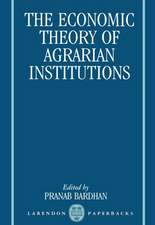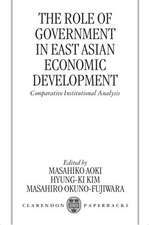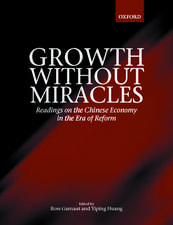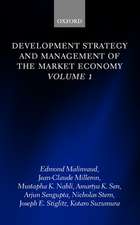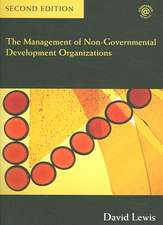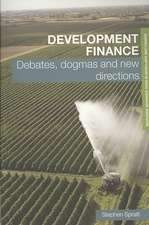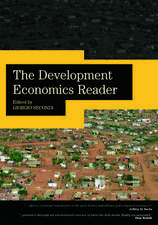The Language of Global Development: A Misleading Geography: Routledge Studies in Development and Society
Autor Marcin Solarzen Limba Engleză Hardback – 15 iul 2014
Taking an intellectual history approach, this book examines the most commonly used spatial terms in the language of development, tracing their origins, meanings, evolution and processes of popularisation and demonstrating how geographical, political and economic concepts were used or misused in creating these terms. The book looks at the origins and the changing nature of fundamental development divisions from prehistoric times to the present day and analyses the process of conceptualising the contemporary North-South divide, focusing especially on the start of spatial development terminology in the twentieth century. It uses detailed maps to assist the reader in visualising the geographical complexities of these spatial terms, and discusses more recently developed terms, such as "emerging markets" and "BRIC", which are key to understanding the modern world.
This book provides a valuable resource for students and researchers in development studies, international relations, geography, sociology and anthropology, as well as practitioners in the field of development.
| Toate formatele și edițiile | Preț | Express |
|---|---|---|
| Paperback (1) | 315.29 lei 6-8 săpt. | |
| Taylor & Francis – feb 2017 | 315.29 lei 6-8 săpt. | |
| Hardback (1) | 792.03 lei 6-8 săpt. | |
| Taylor & Francis – 15 iul 2014 | 792.03 lei 6-8 săpt. |
Din seria Routledge Studies in Development and Society
- 18%
 Preț: 1002.18 lei
Preț: 1002.18 lei -
 Preț: 296.49 lei
Preț: 296.49 lei -
 Preț: 311.41 lei
Preț: 311.41 lei -
 Preț: 353.18 lei
Preț: 353.18 lei -
 Preț: 450.87 lei
Preț: 450.87 lei -
 Preț: 441.11 lei
Preț: 441.11 lei - 18%
 Preț: 1063.31 lei
Preț: 1063.31 lei -
 Preț: 411.42 lei
Preț: 411.42 lei - 26%
 Preț: 820.32 lei
Preț: 820.32 lei -
 Preț: 483.63 lei
Preț: 483.63 lei - 25%
 Preț: 823.81 lei
Preț: 823.81 lei - 16%
 Preț: 275.88 lei
Preț: 275.88 lei - 26%
 Preț: 876.21 lei
Preț: 876.21 lei - 18%
 Preț: 1068.88 lei
Preț: 1068.88 lei -
 Preț: 491.26 lei
Preț: 491.26 lei - 12%
 Preț: 314.79 lei
Preț: 314.79 lei -
 Preț: 404.68 lei
Preț: 404.68 lei - 18%
 Preț: 1069.23 lei
Preț: 1069.23 lei - 18%
 Preț: 1276.52 lei
Preț: 1276.52 lei - 18%
 Preț: 1066.79 lei
Preț: 1066.79 lei -
 Preț: 444.93 lei
Preț: 444.93 lei -
 Preț: 389.70 lei
Preț: 389.70 lei -
 Preț: 410.58 lei
Preț: 410.58 lei -
 Preț: 443.23 lei
Preț: 443.23 lei - 25%
 Preț: 823.17 lei
Preț: 823.17 lei -
 Preț: 357.81 lei
Preț: 357.81 lei - 18%
 Preț: 1059.48 lei
Preț: 1059.48 lei - 18%
 Preț: 1057.89 lei
Preț: 1057.89 lei - 18%
 Preț: 1108.37 lei
Preț: 1108.37 lei - 18%
 Preț: 1062.26 lei
Preț: 1062.26 lei -
 Preț: 446.53 lei
Preț: 446.53 lei - 16%
 Preț: 234.90 lei
Preț: 234.90 lei - 18%
 Preț: 1056.00 lei
Preț: 1056.00 lei -
 Preț: 432.29 lei
Preț: 432.29 lei - 25%
 Preț: 852.88 lei
Preț: 852.88 lei
Preț: 792.03 lei
Preț vechi: 1065.09 lei
-26% Nou
Puncte Express: 1188
Preț estimativ în valută:
151.57€ • 157.28$ • 126.69£
151.57€ • 157.28$ • 126.69£
Carte tipărită la comandă
Livrare economică 15-29 martie
Preluare comenzi: 021 569.72.76
Specificații
ISBN-13: 9780415657020
ISBN-10: 0415657024
Pagini: 194
Ilustrații: 24 black & white illustrations, 4 black & white tables, 20 black & white line drawings
Dimensiuni: 156 x 234 x 18 mm
Greutate: 0.45 kg
Ediția:New.
Editura: Taylor & Francis
Colecția Routledge
Seria Routledge Studies in Development and Society
Locul publicării:Oxford, United Kingdom
ISBN-10: 0415657024
Pagini: 194
Ilustrații: 24 black & white illustrations, 4 black & white tables, 20 black & white line drawings
Dimensiuni: 156 x 234 x 18 mm
Greutate: 0.45 kg
Ediția:New.
Editura: Taylor & Francis
Colecția Routledge
Seria Routledge Studies in Development and Society
Locul publicării:Oxford, United Kingdom
Public țintă
PostgraduateCuprins
Introduction 1. A world always divided: at the sources of contemporary spatial terminology 2. ‘Third World’: origins and meanings 3. ‘Third World’: glory and infamy 4. Newcomers and challengers: ‘developing countries’ and the ‘North-South’ dichotomy 5. The future of the North-South divide and its terminology
Notă biografică
Associate Professor at the Institute of Regional and Global Studies, Faculty of Geography and Regional Studies at the University of Warsaw, Poland. His research interests focus on human geography and international relations, with a special emphasis on political geography, regional geography and North–South relations.
Recenzii
"The volume is much needed for those interested in the geographies and economies of global economic development." – Geographical Education, Professor Stanley D. Brunn, University of Kentucky
"It provides much space for relevant concepts and views barely present in international literature on the topic. It can serve as a useful tool in university teaching in all subjects related to these problems. It can help students understand how we regionalise the world, why we are doing it the way we are, why we use these labels, and how these concepts are related to development theories. With the multilingual and multidisciplinary bibliography one can find the most important and relevant sources on global development and spatial terminology. Students and teachers in the fields of geography, development studies, politics or history can be the main public of this book, but with its easily comprehensible content and readability it is off ered for everyone interested in these issues." - Máté Farkas, Hungarian Geographical Bulletin 65 (2016) (2) 203–205.
"It provides much space for relevant concepts and views barely present in international literature on the topic. It can serve as a useful tool in university teaching in all subjects related to these problems. It can help students understand how we regionalise the world, why we are doing it the way we are, why we use these labels, and how these concepts are related to development theories. With the multilingual and multidisciplinary bibliography one can find the most important and relevant sources on global development and spatial terminology. Students and teachers in the fields of geography, development studies, politics or history can be the main public of this book, but with its easily comprehensible content and readability it is off ered for everyone interested in these issues." - Máté Farkas, Hungarian Geographical Bulletin 65 (2016) (2) 203–205.

